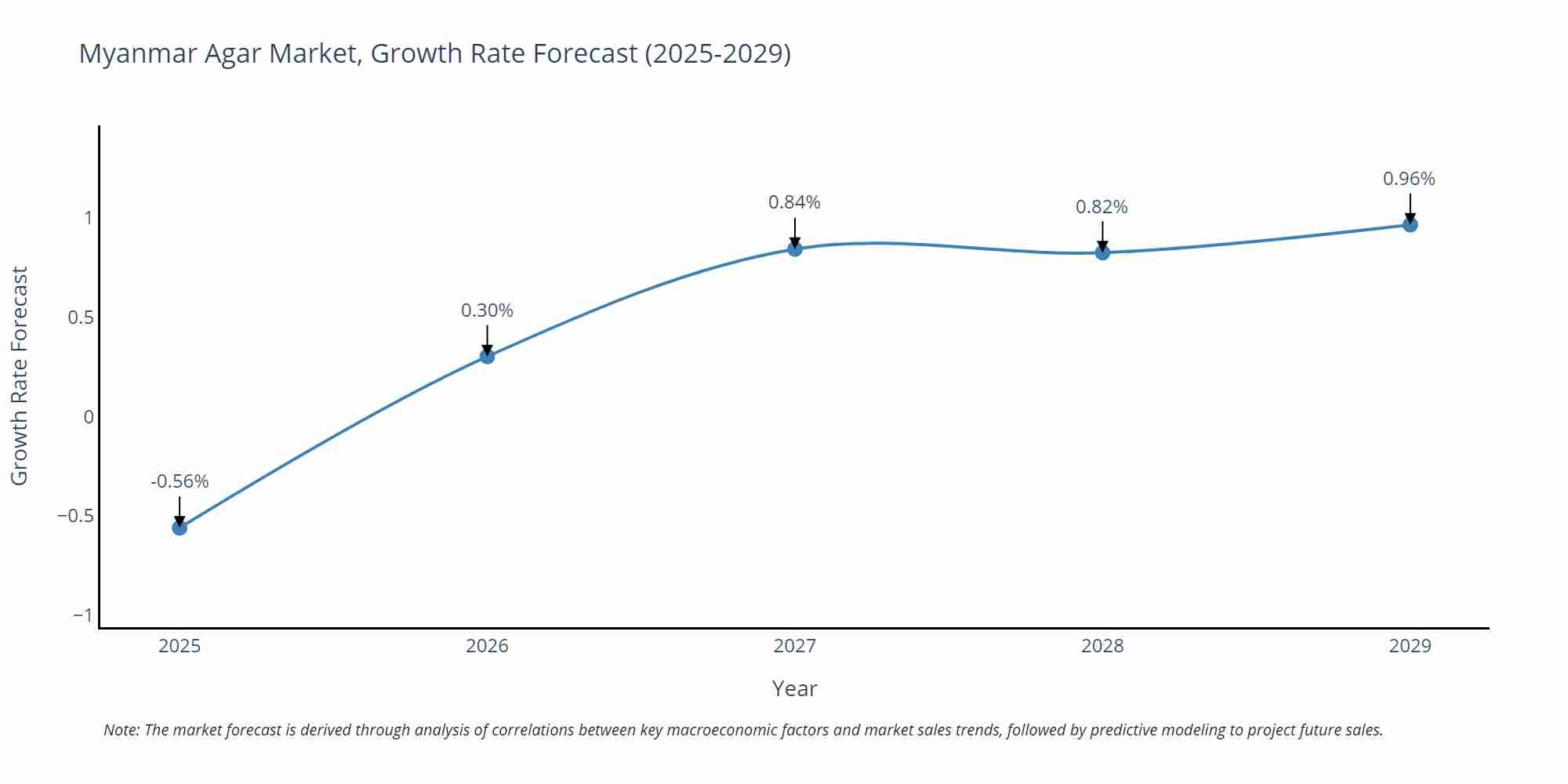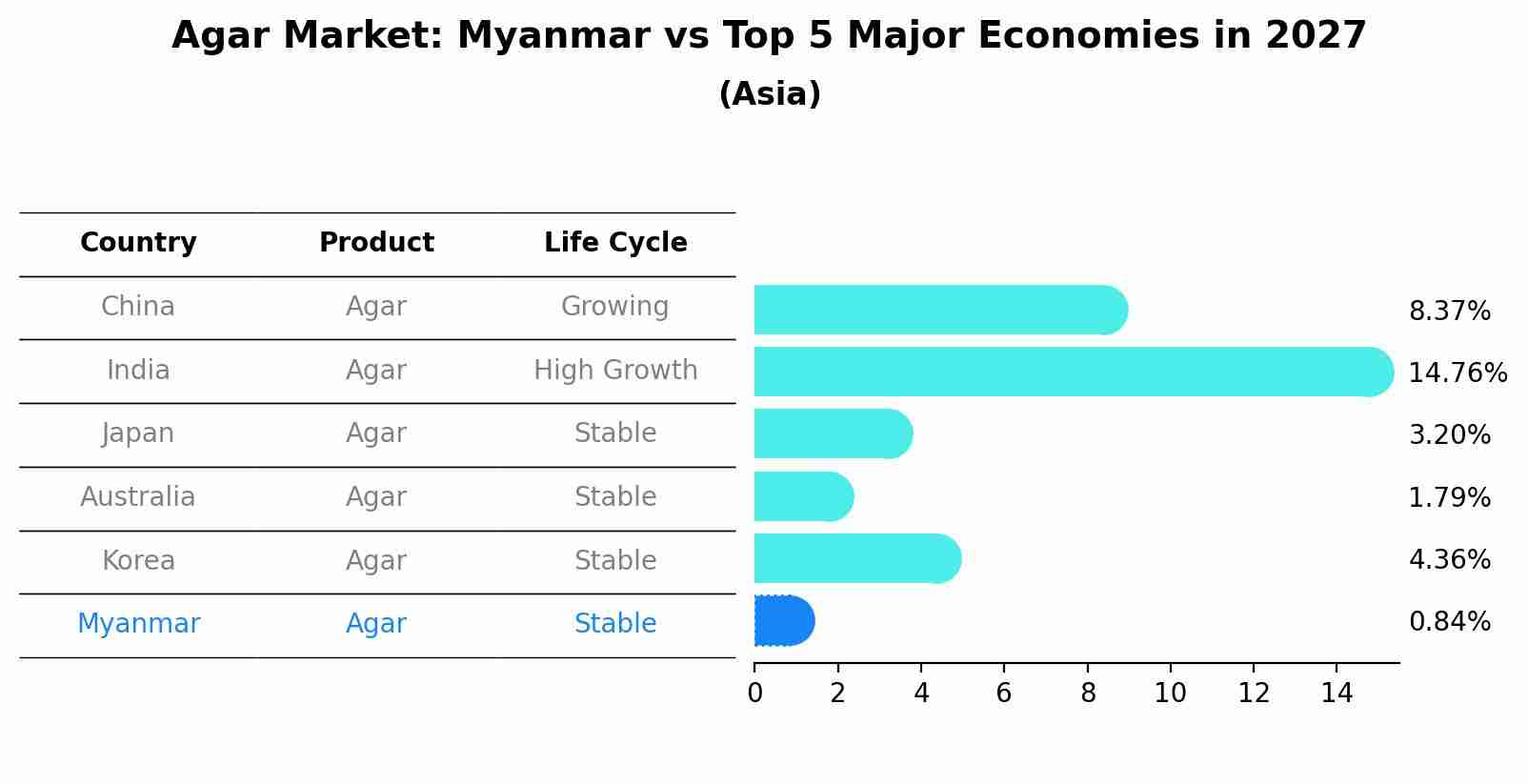Myanmar Agar Market (2025-2031) Outlook | Forecast, Size, Companies, Revenue, Industry, Analysis, Value, Growth, Trends & Share
| Product Code: ETC388414 | Publication Date: Aug 2022 | Updated Date: Jul 2025 | Product Type: Market Research Report | |
| Publisher: 6Wresearch | Author: Sumit Sagar | No. of Pages: 75 | No. of Figures: 35 | No. of Tables: 20 |
Myanmar Agar Market Size Growth Rate
The Myanmar Agar Market is projected to witness mixed growth rate patterns during 2025 to 2029. From -0.56% in 2025, the growth rate steadily ascends to 0.96% in 2029.

Agar Market: Myanmar vs Top 5 Major Economies in 2027 (Asia)
The Agar market in Myanmar is projected to grow at a stable growth rate of 0.84% by 2027, highlighting the country's increasing focus on advanced technologies within the Asia region, where China holds the dominant position, followed closely by India, Japan, Australia and South Korea, shaping overall regional demand.

Myanmar Agar Market Synopsis
The Myanmar Agar Market is experiencing steady growth due to increasing demand for agar in various industries such as food and beverage, pharmaceuticals, and cosmetics. Agar, a gelatinous substance derived from seaweed, is widely used as a gelling agent, stabilizer, and thickener in food products. The market is driven by the rising awareness of agar`s health benefits, such as its high fiber content and low-calorie properties. Additionally, the growing trend of plant-based and vegan products has further boosted the demand for agar as a natural alternative to animal-derived gelatin. Key players in the Myanmar agar market include manufacturers such as Myanmar Foods Industries and Green Future Agar, focusing on product innovation and quality to meet the diverse needs of consumers and industries.
Myanmar Agar Market Trends
The Myanmar Agar market is experiencing steady growth driven by increasing demand from the food and beverage industry for its use as a gelling agent in various products. There is also a growing interest in agar for its applications in the pharmaceutical and cosmetics industries due to its natural and sustainable properties. The market is witnessing a shift towards sustainable sourcing practices and organic agar products, reflecting consumers` preferences for environmentally friendly options. Additionally, technological advancements in agar extraction processes and product development are further shaping the market landscape. Overall, the Myanmar Agar market is expected to continue its growth trajectory, driven by increasing awareness of agar`s versatile applications and the shift towards sustainable and natural ingredients in various industries.
Myanmar Agar Market Challenges
The Myanmar Agar market faces several challenges, including inconsistent quality due to varying production techniques and lack of standardized processing methods. Limited awareness and understanding of Agar among consumers also hinder market growth. Infrastructure constraints, such as inadequate transportation and storage facilities, impact the distribution of Agar products. Additionally, fluctuations in Agar prices and strong competition from other gelatin substitutes further complicate market dynamics. Political instability and regulatory uncertainties in Myanmar can also disrupt Agar production and trade. Overcoming these challenges will require investments in research and development, improved production practices, enhanced marketing efforts, and better industry collaboration to drive sustainable growth in the Myanmar Agar market.
Myanmar Agar Market Investment Opportunities
The Myanmar Agar market presents promising investment opportunities due to the growing demand for agar products in various industries such as food, pharmaceuticals, and cosmetics. With the increasing awareness of the health benefits and versatile applications of agar, there is a rising trend in product innovation and development. Investing in agar production and processing facilities in Myanmar can leverage the country`s abundant natural resources and favorable climatic conditions for agar cultivation. Additionally, exporting high-quality agar products to international markets can further capitalize on the growing global demand. Collaborating with local agar producers, adopting sustainable practices, and ensuring product quality and consistency can help investors establish a strong presence in the Myanmar Agar market and capitalize on its growth potential.
Jordan Agar Market Government Policies
The government of Myanmar has implemented various policies related to the Agar market, a key industry in the country. These policies focus on promoting sustainable harvesting practices, ensuring fair trade, and supporting small-scale Agar producers. The government has established regulations to prevent overharvesting of Agarwood trees and promote reforestation efforts. Additionally, initiatives have been put in place to improve the quality standards of Agar products for export markets. The government also provides support and training programs for small-scale Agar producers to enhance their productivity and competitiveness in the global market. Overall, Myanmar`s government policies aim to balance economic growth in the Agar industry with environmental conservation and fair trade practices.
Myanmar Agar Market Future Outlook
The future outlook for the Myanmar Agar Market appears promising with steady growth expected in the coming years. Factors such as increasing demand for natural ingredients in various industries including food, pharmaceuticals, and cosmetics, coupled with the rising trend of vegan and plant-based products, are likely to drive the market forward. Additionally, the sustainable cultivation practices of agarwood in Myanmar are attracting attention from environmentally conscious consumers. As the global demand for agar continues to rise, Myanmar, known for its high-quality agarwood, is well-positioned to capitalize on this trend. However, challenges such as fluctuating raw material prices and the need for technological advancements in processing methods may impact the market growth to some extent. Overall, the Myanmar Agar Market is expected to witness steady expansion in the foreseeable future.
Key Highlights of the Report:
- Myanmar Agar Market Outlook
- Market Size of Myanmar Agar Market, 2024
- Forecast of Myanmar Agar Market, 2031
- Historical Data and Forecast of Myanmar Agar Revenues & Volume for the Period 2021 - 2031
- Myanmar Agar Market Trend Evolution
- Myanmar Agar Market Drivers and Challenges
- Myanmar Agar Price Trends
- Myanmar Agar Porter's Five Forces
- Myanmar Agar Industry Life Cycle
- Historical Data and Forecast of Myanmar Agar Market Revenues & Volume By Form for the Period 2021 - 2031
- Historical Data and Forecast of Myanmar Agar Market Revenues & Volume By Strip for the Period 2021 - 2031
- Historical Data and Forecast of Myanmar Agar Market Revenues & Volume By Powder for the Period 2021 - 2031
- Historical Data and Forecast of Myanmar Agar Market Revenues & Volume By Others for the Period 2021 - 2031
- Historical Data and Forecast of Myanmar Agar Market Revenues & Volume By Application for the Period 2021 - 2031
- Historical Data and Forecast of Myanmar Agar Market Revenues & Volume By Food and Beverage for the Period 2021 - 2031
- Historical Data and Forecast of Myanmar Agar Market Revenues & Volume By Pharmaceuticals for the Period 2021 - 2031
- Historical Data and Forecast of Myanmar Agar Market Revenues & Volume By Other Applications for the Period 2021 - 2031
- Myanmar Agar Import Export Trade Statistics
- Market Opportunity Assessment By Form
- Market Opportunity Assessment By Application
- Myanmar Agar Top Companies Market Share
- Myanmar Agar Competitive Benchmarking By Technical and Operational Parameters
- Myanmar Agar Company Profiles
- Myanmar Agar Key Strategic Recommendations
Frequently Asked Questions About the Market Study (FAQs):
- Single User License$ 1,995
- Department License$ 2,400
- Site License$ 3,120
- Global License$ 3,795
Search
Thought Leadership and Analyst Meet
Our Clients
Related Reports
- Germany Breakfast Food Market (2026-2032) | Industry, Share, Growth, Size, Companies, Value, Analysis, Revenue, Trends, Forecast & Outlook
- Australia Briquette Market (2025-2031) | Growth, Size, Revenue, Forecast, Analysis, Trends, Value, Share, Industry & Companies
- Vietnam System Integrator Market (2025-2031) | Size, Companies, Analysis, Industry, Value, Forecast, Growth, Trends, Revenue & Share
- ASEAN and Thailand Brain Health Supplements Market (2025-2031) | Strategy, Consumer Insights, Analysis, Investment Trends, Opportunities, Growth, Size, Share, Industry, Revenue, Segments, Value, Segmentation, Supply, Forecast, Restraints, Outlook, Competition, Drivers, Trends, Demand, Pricing Analysis, Competitive, Strategic Insights, Companies, Challenges
- ASEAN Bearings Market (2025-2031) | Strategy, Consumer Insights, Analysis, Investment Trends, Opportunities, Growth, Size, Share, Industry, Revenue, Segments, Value, Segmentation, Supply, Forecast, Restraints, Outlook, Competition, Drivers, Trends, Demand, Pricing Analysis, Competitive, Strategic Insights, Companies, Challenges
- Europe Flooring Market (2025-2031) | Outlook, Share, Industry, Trends, Forecast, Companies, Revenue, Size, Analysis, Growth & Value
- Saudi Arabia Manlift Market (2025-2031) | Outlook, Size, Growth, Trends, Companies, Industry, Revenue, Value, Share, Forecast & Analysis
- Uganda Excavator, Crane, and Wheel Loaders Market (2025-2031) | Strategy, Consumer Insights, Analysis, Investment Trends, Opportunities, Growth, Size, Share, Industry, Revenue, Segments, Value, Segmentation, Supply, Forecast, Restraints, Outlook, Competition, Drivers, Trends, Demand, Pricing Analysis, Competitive, Strategic Insights, Companies, Challenges
- Rwanda Excavator, Crane, and Wheel Loaders Market (2025-2031) | Strategy, Consumer Insights, Analysis, Investment Trends, Opportunities, Growth, Size, Share, Industry, Revenue, Segments, Value, Segmentation, Supply, Forecast, Restraints, Outlook, Competition, Drivers, Trends, Demand, Pricing Analysis, Competitive, Strategic Insights, Companies, Challenges
- Kenya Excavator, Crane, and Wheel Loaders Market (2025-2031) | Strategy, Consumer Insights, Analysis, Investment Trends, Opportunities, Growth, Size, Share, Industry, Revenue, Segments, Value, Segmentation, Supply, Forecast, Restraints, Outlook, Competition, Drivers, Trends, Demand, Pricing Analysis, Competitive, Strategic Insights, Companies, Challenges
Industry Events and Analyst Meet
Whitepaper
- Middle East & Africa Commercial Security Market Click here to view more.
- Middle East & Africa Fire Safety Systems & Equipment Market Click here to view more.
- GCC Drone Market Click here to view more.
- Middle East Lighting Fixture Market Click here to view more.
- GCC Physical & Perimeter Security Market Click here to view more.
6WResearch In News
- Doha a strategic location for EV manufacturing hub: IPA Qatar
- Demand for luxury TVs surging in the GCC, says Samsung
- Empowering Growth: The Thriving Journey of Bangladesh’s Cable Industry
- Demand for luxury TVs surging in the GCC, says Samsung
- Video call with a traditional healer? Once unthinkable, it’s now common in South Africa
- Intelligent Buildings To Smooth GCC’s Path To Net Zero


















